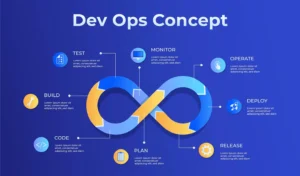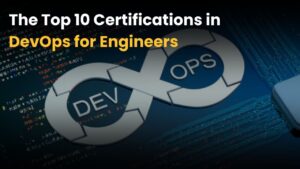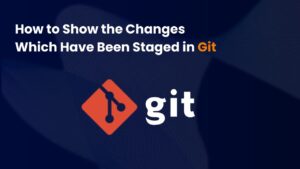The modern software development world is vast and full of exciting career paths. Two of the most sought-after and impactful roles are DevOps engineers and Full Stack developers. Both roles require a mix of technical expertise, problem-solving skills, and a passion for technology. However, they serve different purposes and require different skill sets.
In this article, we will explore the key differences between DevOps and full-stack development, compare their responsibilities, career prospects, salaries, required skills, tools used, and more. By the end, you will be able to determine which path suits your interests, career goals, and strengths.
Understanding the Roles
What is DevOps?
DevOps (Development + Operations) is a culture and set of practices that aim to bridge the gap between software development and IT operations. The primary goal is to deliver software faster, reliably, and efficiently.
A DevOps engineer automates the software development lifecycle (SDLC) processes, including integration, testing, deployment, monitoring, and infrastructure management. They focus on CI/CD pipelines, cloud infrastructure, security automation, and system reliability.
What is Full Stack Development?
A Full Stack Developer is a software engineer proficient in both frontend and backend development. They can build entire web or mobile applications independently or with a team, handling UI/UX, business logic, and database integration.
They are adept in technologies like HTML, CSS, JavaScript (React/Angular), server-side languages (Node.js, Python, Java), and databases (MongoDB, MySQL, PostgreSQL).
Crucial Duties of DevOps Engineers
The overall efficacy and efficiency of the software development lifecycle are enhanced by the many duties performed by DevOps engineers. Among the principal duties are:
- Continuous Integration and Continuous Delivery (CI/CD):
DevOps engineers automate the integration of code changes, test execution, and software deployment to production environments by implementing and maintaining continuous integration and delivery (CI/CD) pipelines. They provide a software delivery method that is quicker and more dependable.
- Automation: DevOps engineers automate a number of software development processes, including as application deployment, configuration management, and infrastructure provisioning. To simplify these procedures and lower the possibility of human mistake, they make use of programs like Ansible, Puppet, or Chef.
- Infrastructure Management: The infrastructure needed for software development and deployment is overseen by DevOps engineers. To provide and configure servers, storage, and networking resources, they collaborate with cloud platforms such as Google Cloud Platform (GCP), Amazon Web Services (AWS), and Microsoft Azure. They also guarantee the infrastructure’s security, scalability, and high availability.
DevOps Training in Pune provides a great environment to upskills these valuable skills.
Who Are Full-Stack Developers?
Full Stack Developers are versatile software engineers who have the skills and knowledge to work on both the frontend (client-side) and backend (server-side) of web or mobile applications. They are capable of building an entire software product from scratch — everything from designing the user interface to managing server databases and business logic.
They are often described as “jack-of-all-trades” in web development because they bridge the gap between user experience and application functionality. This makes them valuable in both small startups (where versatility is key) and large tech companies (where collaboration and integration are crucial).
Key Areas of Expertise
A Full Stack Developer typically has knowledge in the following areas:
1. Frontend Development (Client-Side)
This is the part of the application that users interact with.
- Languages: HTML, CSS, JavaScript
- Frameworks/Libraries: React.js, Angular, Vue.js
- Tools: Webpack, Babel, SASS
Responsibilities:
- Designing user-friendly interfaces
- Making responsive and accessible layouts
- Ensuring browser compatibility
2. Backend Development (Server-Side)
This is the logic that runs behind the scenes and handles data processing.
- Languages: Node.js, Python (Django, Flask), Java (Spring Boot), Ruby on Rails, PHP
- Database Management: MySQL, PostgreSQL, MongoDB, Firebase
- API Development: RESTful APIs, GraphQL
- Authentication & Authorization: OAuth, JWT, Passport.js
3. Version Control & Collaboration
Tools: Git, GitHub, GitLab, Bitbucket
Track changes in code, manage branches, and collaborate with teams.
4. DevOps Basics (Optional but Valuable)
Tools: Docker, Jenkins, Heroku, AWS
Understanding CI/CD and deployment processes improves efficiency.
Differences Between Full Stack Developers and DevOps
Although they both make substantial contributions to the software development process, DevOps Engineers and Full Stack Developers have distinct specialties and limitations. Among the main distinctions are:
Differences Between Full Stack Developers and DevOps Engineers
In the evolving world of software engineering, two roles stand out due to their critical contributions to product development and delivery: Full Stack Developers and DevOps Engineers. While both are integral to building and deploying modern applications, their responsibilities, skill sets, and day-to-day activities are quite distinct.
This article outlines the key differences between Full Stack Developers and DevOps Engineers across various dimensions, including roles, skills, tools, workflows, and career paths.
Role Focus and Responsibilities
| Criteria | Full Stack Developer | DevOps Engineer |
| Main Focus | Application development (both frontend and backend) | Automation of software delivery, deployment, and infrastructure management |
| Responsibilities | Build user interfaces, backend logic, APIs, and database integration | Manage CI/CD pipelines, automate deployments, monitor systems, and manage cloud infrastructure |
| Goal | Deliver a functional, user-friendly, and scalable application | Ensure fast, reliable, and secure software deployment with system uptime and performance |
2. Skill Set and Technical Expertise
| Area | Full Stack Developer | DevOps Engineer |
| DevOps Engineer | HTML, CSS, JavaScript, React, Angular, Vue.js | Optional (not a focus area) |
| Backend Skills | Node.js, Django, Java, PHP, Ruby | Familiar with backend for deployment, but not a primary developer |
| Database | SQL (MySQL, PostgreSQL), NoSQL (MongoDB) | Understands DB integration for deployment and scaling |
| Infrastructure | Basic knowledge (optional) | Deep expertise in cloud computing, networking, and servers |
| Scripting & Automation | Basic scripting (JavaScript, Python) | Advanced scripting (Bash, Python, Groovy) for automation tasks |
3. Tools and Technologies
| Category | Full Stack Developer | DevOps Engineer |
| Development Tools | VS Code, Git, Postman, Chrome DevTools | Git, Docker, Jenkins, Terraform |
| Cloud Platforms Optional | (e.g., Firebase) AWS, Azure, | GCP (core skill) |
| Containerization | May use Docker for testing | Uses Docker, Kubernetes extensively for deployment |
| CI/CD Tools | May interact with Jenkins or GitHub Actions | Designs, implements, and manages CI/CD pipelines |
| Monitoring & Logging | Not typically involved | Uses Prometheus, Grafana, ELK Stack for system health monitoring |
4. Project Involvement Timeline
Full Stack Developers are heavily involved during the development phase, building features and fixing bugs.
DevOps Engineers are active throughout the deployment and post-deployment phases, ensuring uptime, reliability, and performance.
Example:
A Full Stack Developer builds a chat application.
A DevOps Engineer sets up CI/CD to automatically deploy it, configures load balancing, and monitors uptime.
5. Workflow and Collaboration
| Aspect | Full Stack Developer | DevOps Engineer |
| Works Closely With | UI/UX designers, Backend engineers, Product managers | Developers, QA teams, Security teams, Cloud teams |
| Team Culture | Product and feature-driven | Process, automation, and stability-driven |
| Agile Role | Focuses on sprint-based feature delivery | Supports continuous integration and delivery cycles |
6. Career Path and Growth
| Career Growth | Full Stack Developer | DevOps Engineer |
| Next Roles | Tech Lead, Software Architect, Product Engineer | Reliability Engineer (SRE), Platform Engineer, Cloud Architect |
| Certifications | React/Node.js certs, Full Stack Bootcamps | AWS DevOps, Docker, Kubernetes, CKA, Terraform certs |
| Versatility | Can shift between frontend/backend or specialize | Can shift into cloud, security, or SRE roles |
7. Salary and Job Market Trends (2025)
| Factor | Full Stack Developer | DevOps Engineer |
| Entry-Level Salary (USA) | $70,000 – $100,000 | $80,000 – $110,000 |
| Mid-Level Salary | $110,000 – $130,000 | $120,000 – $140,000 |
| Senior-Level Salary | $140,000+ | $150,000+ |
| Job Demand | High across startups, web apps, and agencies | High in cloud-based companies, enterprise IT, fintech |
8. Learning Curve
Full Stack Development: Has a progressive learning curve — developers often start with frontend and move to backend or vice versa. Many online bootcamps and self-paced courses are available.
DevOps Engineering: Has a steeper learning curve. Requires knowledge of systems administration, cloud platforms, automation tools, and deployment pipelines.
9. Type of Work
| Type | Full Stack Developer | DevOps Engineer |
| Creative Work | High (UI design, feature development) | Low to Moderate |
| Automation Work | Low | High (scripted builds, infrastructure as code) |
| Real-Time Problem Solving | Debugging application issues | Managing outages, scaling, and deployment failures |
Benefits of DevOps Engineering
DevOps engineers use lean and agile approaches to change the IT culture while guaranteeing that IT services and solutions are delivered on time. Additionally, DevOps facilitates productive cooperation between the development and operations teams. Getting training in DevOps development has several advantages, including:
- Building top-notch services by putting DevOps procedures into practice.
- DevOps engineers’ help in controlling unnecessary capital expenses while facilitating quick delivery and replication.
- DevOps engineers regularly mitigate mistakes, problems, and obstacles.
- DevOps engineers specialize in certain duties, which leads to improved information security and safety.
A Full Stack Developer’s Benefits
Depending on your project’s particular requirements, they can switch between front-end and back-end jobs with ease.
- Don’t let the constraints of a single framework feature limit your full-stack development efforts.
- A developer may offer thorough support for a variety of jobs throughout full-stack development, including web coding, design structure, and other associated areas.
- In addition to creating your project, a developer may supervise and manage the whole design process to completion.
- There is a high demand for their services as a result of their exceptional ability to adjust to new developments and concepts.
Conclusion
In the software development business, both DevOps and Full Stack development are important positions, although their duties and areas of concentration are different. While DevOps Engineers focus on improving software delivery and automating procedures, Full full-stack developers are adept at creating user-centric online apps. You may find out which position best suits your objectives by evaluating your abilities, hobbies, and professional ambitions. Whichever route you decide on, success in the rapidly evolving technology world of today depends on ongoing education and keeping abreast of market trends.







